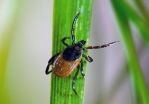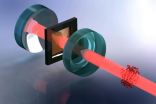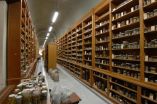INFORMATION:
The research was supported by the NIAID extramural (AI098628) and intramural research programs and by the NIH Office of Research Infrastructure Programs (Primate centers: P51OD11132). END
Masking HIV target cells prevents viral transmission in animal model
Alpha-4-beta-7 integrin antibody prevents SIV transmission in non-human primates
2014-11-24
(Press-News.org) Cloaking immune cells with antibodies that block T cell trafficking to the gut can substantially reduce the risk of viral transmission in a non-human primate model of HIV infection, scientists report.
The findings suggest that drugs that are already in clinical trials for inflammatory bowel diseases might be effective in the treatment or prevention of HIV infection.
The results are scheduled for publication in Nature Medicine.
"We were surprised by the effects that we observed," says senior author Aftab Ansari, PhD, professor of pathology and laboratory medicine at Emory University School of Medicine and Yerkes National Primate Research Center.
"Our goal was to demonstrate that blocking CD4+ T cell trafficking to gut tissues could decrease the level of virus in the gut and help mount an effective immune response, but we found that administration of the antibody could actually prevent transmission."
"The results of this study suggest that this form of therapy could counteract pathologies that lead to gastrointestinal symptoms and poor outcomes in HIV infection. Exploration of how this could be combined with anti-retroviral drug regimens is warranted."
The co-first authors of the paper are Siddappa Byrareddy, PhD, Emory assistant professor of pathology and laboratory medicine, and research specialist Brianne Kallam, now in graduate school at the University of North Carolina.
Collaborators included Janet McNicholl, MD and Ellen Kersh, PhD, at the Division of HIV/AIDS Prevention, Centers for Disease Control and Prevention (CDC); and James Arthos, PhD, Claudia Cicala, PhD, and Anthony Fauci, MD, in the Laboratory of Immunoregulation, National Institute of Allergy and Infectious Diseases (NIAID), National Institutes of Health. Other collaborators at Emory University, the University of Massachusetts, the German Primate Center in Gottingen, the CDC and Georgia Institute of Technology played key roles.
CD4+ T cells found in the gut are key early targets during HIV infection and their depletion is a harbinger of disease progression. Researchers were able to "mask" these cells by using an antibody against a4b7 integrin, a molecule that promotes these T cells' homing to gut-associated lymphoid tissues.
The antibody does not eliminate the T cells, but it prevents them from homing to the gut and also blocks their interaction with infectious virus.
A previous study of anti-a4b7 treatment in acute SIV infection found that it could not only suppress viral load, but also keep treated animals healthy for years, while control animals' SIV infection progressed to AIDS.
In the Nature Medicine report, researchers examined the effect of targeting a4b7 in a model where female rhesus macaques were repeatedly challenged once per week with HIV's cousin SIV intravaginally.
Ten out of 12 control animals became infected. In contrast, only one out of 12 a4b7-antibody-treated animals became infected by week five. Five more became infected by week eight, and six of twelve remained uninfected. The researchers calculated that anti-a4b7 treatment leads to a 2.7 fold decreased risk per challenge.
The researchers also observed a decrease in the level of virus in gut tissues and the presence of residual virus in cervical tissues in alpha-4-beta-7-antibody-treated animals. They interpret this as indicating that viral transport away from the point of infection is inhibited
"Masking a4b7 integrin may be preventing transmission by suppressing the spread of a nascent genital infection to the gut, where large numbers of vulnerable T cells reside," Ansari says.
ELSE PRESS RELEASES FROM THIS DATE:
Animals steal defenses from bacteria
2014-11-24
It's a dog eat dog world, and bacteria have been living in it for a long time. It's of no surprise that bacteria have a sophisticated arsenal to compete with each other for valuable resources in the environment. In 2010, work led by University of Washington Department of Microbiology Associate Professor Joseph Mougous uncovered a weaponry system used in this warfare between bacteria. The combatants inject deadly toxins into rival cells.
Now, in a surprising twist, Mougous and colleagues have found that many animals have taken a page from the bacterial playbook. They steal ...
Global warming cynics unmoved by extreme weather
2014-11-24
EAST LANSING, Mich. --- What will it take to convince skeptics of global warming that the phenomenon is real? Surely, many scientists believe, enough droughts, floods and heat waves will begin to change minds.
But a new study led by a Michigan State University scholar throws cold water on that theory.
Only 35 percent of U.S. citizens believe global warming was the main cause of the abnormally high temperatures during the winter of 2012, Aaron M. McCright and colleagues report in a paper published online today in the journal Nature Climate Change.
"Many people already ...
Cooling with the coldest matter in the world
2014-11-24
Physicists at the University of Basel have developed a new cooling technique for mechanical quantum systems. Using an ultracold atomic gas, the vibrations of a membrane were cooled down to less than 1 degree above absolute zero. This technique may enable novel studies of quantum physics and precision measurement devices, as the researchers report in the journal Nature Nanotechnology.
Ultracold atomic gases are among the coldest objects in existence. Laser beams can be used to trap atoms inside a vacuum chamber and slow down their motion to a crawl, reaching temperatures ...
Italian natural history museums on the verge of collapse?
2014-11-24
Are Italian natural history museums (NHMs) on the verge of collapse? A new analysis published in the open access journal ZooKeys points out that these institutions are facing a critical situation due to progressive loss of scientific relevance, decreasing economic investments and scarcity of personnel.
The study proposes that existing museums associate and collaborate to form a diffused structure, able to better manage their scientific collections and share resources and personnel.
"Italy is universally known for its history, culture, food and art. The list of Italian ...
New method to determine antibiotic resistance fast
2014-11-24
Scientists from Uppsala University, the Science for Life Laboratory (SciLifeLab) in Stockholm and Uppsala University Hospital have developed a new method of rapidly identifying which bacteria are causing an infection and determining whether they are resistant or sensitive to antibiotics. The findings are now being published in the Journal of Clinical Microbiology.
'Clinical use of the method would mean that the right antibiotic treatment could be started straightaway, reducing unnecessary use of antibiotics,' says Professor Dan I. Andersson of Uppsala University, who ...
Cell's skeleton is never still
2014-11-24
HOUSTON - (Nov. 24, 2014) - New computer models that show how microtubules age are the first to match experimental results and help explain the dynamic processes behind an essential component of every living cell, according to Rice University scientists.
The results could help scientists fine-tune medications that manipulate microtubules to treat cancer and other diseases. Rice theoretical biophysicist Anatoly Kolomeisky and postdoctoral researcher Xin Li reported their results in the Journal of Physical Chemistry B.
Microtubules are cylinders made of 13 protein strands ...
Sleep apnea linked to poor aerobic fitness
2014-11-24
People with moderate to severe obstructive sleep apnea may have an intrinsic inability to burn high amounts of oxygen during strenuous aerobic exercise, according to a new study led by researchers at University of California, San Diego School of Medicine.
The study, reported in the current issue of Journal of Clinical Sleep Medicine, shows that people with sleep apnea, in which breathing repeatedly starts and stops during slumber, have a lower peak oxygen uptake during aerobic activity than those who do not suffer from the sleep disorder.
People who suffer from apnea ...
Avoiding ecosystem collapse
2014-11-24
From coral reefs to prairie grasslands, some of the world's most iconic habitats are susceptible to sudden collapse due to seemingly minor events. A classic example: the decimation of kelp forests when a decline of otter predation unleashes urchin population explosions. Three studies published in the Nov. 24 special issue of Philosophical Transactions of the Royal Society Biological Science hold the promise of helping resource managers predict, avoid, and reverse the tipping points that lead to degraded habitats, economic losses, and social upheaval.
The studies are the ...
Has a possible new lead been found in the fight against neurodegenerative diseases?
2014-11-24
Good communication between brain cells is vital for optimal (mental) health. Mutations in the TBC1D24 gene inhibit this process, thereby causing neurodegeneration and epilepsy. Fruit flies with a defect in Skywalker, the fruit fly variant of TBC1D24, are being used as a model for neurodegeneration. Researchers from VIB and KU Leuven have succeeded in completely suppressing neurodegeneration in such fruit flies, by partially inhibiting the breakdown of 'defective' proteins in brain cells.
Patrik Verstreken (VIB/KU Leuven): "These unexpected results offer us a new line ...
High-dose interleukin-2 effective in mRCC pre-treated with VEGF-targeted therapies
2014-11-24
VIDEO:
High-dose interleukin-2 can be effective in selected metastatic renal cell cancer patients pre-treated with VEGF-targeted agents, reveals research presented today at the ESMO Symposium on Immuno-Oncology in Geneva, Switzerland....
Click here for more information.
Lugano/Geneva, Switzerland, 24 November 2014 - High-dose interleukin-2 can be effective in selected metastatic renal cell cancer patients pre-treated with VEGF-targeted agents, reveals research presented ...
LAST 30 PRESS RELEASES:
A kaleidoscope of cosmic collisions: the new catalogue of gravitational signals from LIGO, Virgo and KAGRA
New catalog more than doubles the number of gravitational-wave detections made by LIGO, Virgo, and KAGRA observatories
Antifibrotic drug shows promise for premature ovarian insufficiency
Altered copper metabolism is a crucial factor in inflammatory bone diseases
Real-time imaging of microplastics in the body improves understanding of health risks
Reconstructing the world’s ant diversity in 3D
UMD entomologist helps bring the world’s ant diversity to life in 3D imagery
ESA’s Mars orbiters watch solar superstorm hit the Red Planet
The secret lives of catalysts: How microscopic networks power reactions
Molecular ‘catapult’ fires electrons at the limits of physics
Researcher finds evidence supporting sucrose can help manage painful procedures in infants
New study identifies key factors supporting indigenous well-being
Bureaucracy Index 2026: Business sector hit hardest
ECMWF’s portable global forecasting model OpenIFS now available for all
Yale study challenges notion that aging means decline, finds many older adults improve over time
Korean researchers enable early detection of brain disorders with a single drop of saliva!
Swipe right, but safer
Duke-NUS scientists identify more effective way to detect poultry viruses in live markets
Low-intensity treadmill exercise preconditioning mitigates post-stroke injury in mouse models
How moss helped solve a grave-robbing mystery
How much sleep do teens get? Six-seven hours.
Patients regain weight rapidly after stopping weight loss drugs – but still keep off a quarter of weight lost
GLP-1 diabetes drugs linked to reduced risk of addiction and substance-related death
Councils face industry legal threats for campaigns warning against wood burning stoves
GLP-1 medications get at the heart of addiction: study
Global trauma study highlights shared learning as interest in whole blood resurges
Almost a third of Gen Z men agree a wife should obey her husband
Trapping light on thermal photodetectors shatters speed records
New review highlights the future of tubular solid oxide fuel cells for clean energy systems
Pig farm ammonia pollution may indirectly accelerate climate warming, new study finds
[Press-News.org] Masking HIV target cells prevents viral transmission in animal modelAlpha-4-beta-7 integrin antibody prevents SIV transmission in non-human primates





